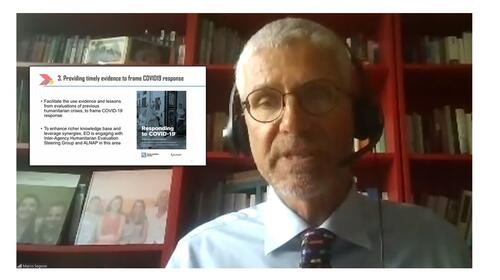On 15 May 2020, at the Informal Meeting of the Executive Board Annual Session 2020, UNFPA Executive Director, Dr. Natalia Kanem, in her introductory remarks emphasized UNFPA commitment to evaluation and to further accelerate the use of evaluations, to ensure the organization’s decisions and actions continue to be based on evidence. She commended the progress of the evaluation function in 2019 and highlighted the critical importance of evaluation, particularly during the COVID-19 crisis.
This was followed by presentation of the Annual Report on the evaluation function 2019 by Marco Segone, Director, UNFPA Evaluation Office. The Annual Report provides an overview of the performance of the evaluation function at centralized and decentralized levels, as well as the contribution of UNFPA to the UN coherence in evaluation, including system-wide evaluations, and multi-stakeholder partnerships for national evaluation capacity development. The Director outlined efforts of UNFPA to adapt evaluation on a real time basis to the COVID-19 crisis, to ensure credible evaluative evidence continues to be available for the organization as it adjusts its programming to respond to the pandemic.
He further highlighted the newly launched campaign by the Evaluation Office, ‘Decade of EVALUATION for Action’ or the Eval4Action campaign, together with the EvalYouth Global Network and Global Parliamentarians Forum on Evaluation. In alignment with and support to, UN Secretary-General’s Decade of Action campaign, Eval4Action advocates for stronger national evaluation capacities to accelerate the delivery of SDGs by 2030.
The Evaluation Office presented the results of the evaluation of the UNFPA capacity in humanitarian action (2012-2019). The evaluation assesses the organizational capacity of UNFPA in humanitarian action globally, in terms of both preparedness and response. This evaluation provides, UNFPA in general, and the newly created Humanitarian Office in particular, with a timely opportunity to take stock of the lessons from almost a decade of humanitarian action, since the adoption of the UNFPA Second humanitarian strategy, in 2012.
The Evaluation Office’s statements were followed by the management commentary to the Annual Report on the evaluation function 2019 and the management response to the evaluation of the UNFPA capacity in humanitarian action (2012-2019).
The meeting was attended by 25 Member States, who in their remarks highly valued the Evaluation Office’s efforts to strengthen the evaluation function in 2019, including through enhancing the use of evaluations through communications and knowledge management. The Member States also welcomed the adaptation of UNFPA evaluations to the COVID-19 crisis, the commitment of the evaluation function toward the UN reform agenda and its efforts to strengthen national evaluation capacities.
